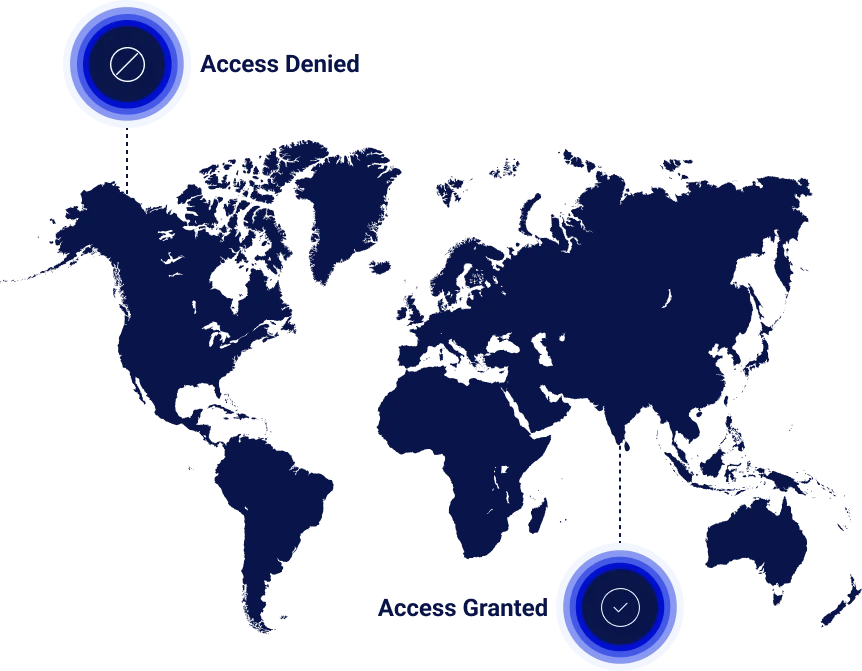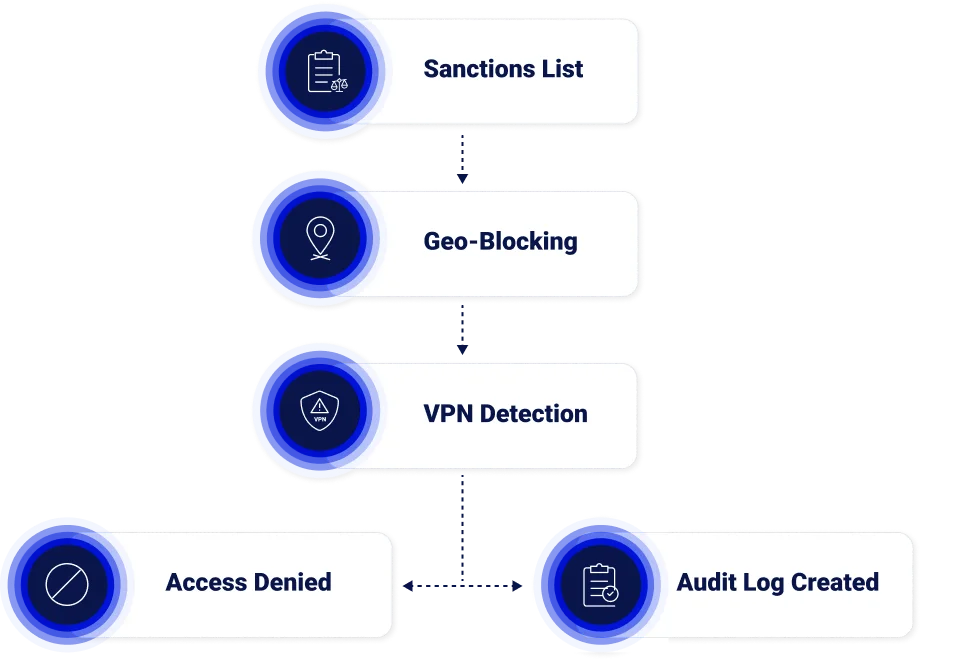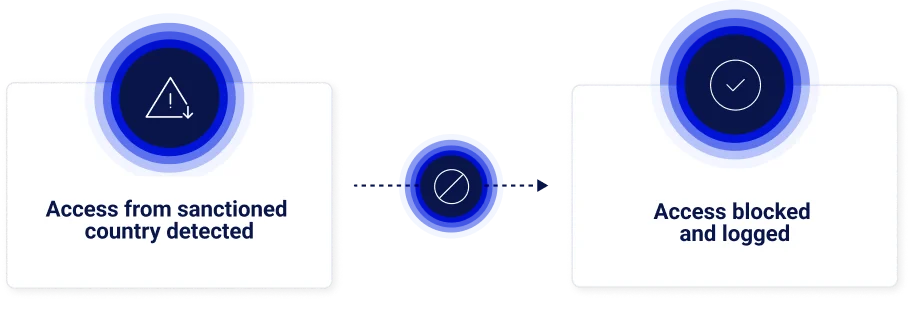2025 Guide to Geo-Blocking for Sanctions Compliance Under OFAC and EU Laws
What is sanctions compliance geo-blocking and why it matters for OFAC and EU rules
International sanctions regulations are tightening, and even unintentional access from embargoed regions can result in severe penalties under OFAC or EU law. Geo-blocking and VPN detection are now critical tools, not optional, for businesses aiming to enforce digital borders.
Sanctions-focused geo-blocking helps businesses proactively restrict digital access from embargoed regions, while maintaining detailed enforcement logs. These records are often essential for showing regulators that preventive measures are in place.
This article covers how geo-blocking works, why it matters for compliance, how VPN detection fits into the picture, and how Clym’s platform helps businesses handle these complexities with less manual effort.

Why geo-blocking matters for sanctions compliance
Sanctions laws restrict trade, services, and interactions with specific countries, regions, or individuals. Breaches can result in:
- Substantial financial penalties
- Criminal liability
- Long-term damage to brand and trust
Geo-blocking for sanctions compliance allows businesses to:
- Enforce restricted country access in real time
- Reduce regulatory exposure by automating embargo enforcement
- Maintain records of blocked access for audit trails and reporting
When accurate and consistently updated, geo-blocking becomes a powerful digital firewall, supporting compliance teams without draining IT resources.

Who needs geo-blocking for OFAC and EU sanctions compliance
Sanctions compliance isn’t just for multinationals. Many industries, including SaaS, ecommerce, fintech, and media, risk unintentional violations if they serve sanctioned users digitally.
Examples include:
- OFAC Sanctions (U.S.) – Targeted countries (e.g., Iran, Syria, North Korea) and Specially Designated Nationals (SDNs)
- EU Sanctions – Council Regulations that apply to countries like Russia, Belarus, and entities violating international law
Violations may result in:
- Monetary penalties reaching millions of dollars
- Criminal charges in severe cases
- Long-term reputational damage
Real-world example:
In 2023, OFAC fined a U.S.-based software provider over $300,000 for allowing users in Crimea to access digital services, despite no direct targeting. This highlights that geo-restrictions for sanctions aren't optional.
How VPN detection strengthens sanctions compliance geo-blocking
Even with geo-blocking in place, users may try to bypass restrictions with VPNs or proxy services that mask their location.
VPN detection for sanctions compliance helps:
- Identify traffic from known VPN or anonymizer IPs
- Stop suspicious access attempts before they breach rules
- Reduce false compliance confidence from incomplete geo-blocking
Clym’s platform detects location spoofing and lets you log, flag, or block such behavior based on customizable enforcement rules.
Common challenges in sanctions compliance and geo-blocking
While necessary, geo-blocking can create operational complexity:
- Inaccurate IP databases can result in overblocking or missed enforcement
- Sanctions lists change frequently, requiring dynamic updates
- Overly broad restrictions may harm UX for legitimate users
- Privacy concerns arise if user data isn't processed properly
Automated geo-blocking with smart configurations, audit logs, and VPN detection reduces these friction points.
How Clym helps enforce sanctions geo-blocking
Managing sanctions-based geo-blocking can be complex, especially when sanctions lists change often, VPN use is on the rise, and manual updates create room for mistakes. Clym offers two complementary solutions that make this process faster, more accurate, and easier to manage.
Restrictions
Restrictions allow businesses to block or limit access to their websites based on country, region, or specific IP ranges. You can:
- Automatically enforce geographic restrictions that align with sanctions rules.
- Detect and respond to VPN-based location spoofing.
- Customize on-screen messages for blocked visitors, keeping the experience professional.
- Maintain logs for auditing and regulatory inquiries.
No more manual IP list updates, inconsistent enforcement, or lack of records for audits.
Guardrails
Guardrails work behind the scenes to automatically apply your restriction rules, integrate with your website, and adjust settings as regulations change. You can:
- Automate enforcement without relying on developer intervention.
- Apply consistent rules across all domains from one dashboard.
- Combine with other Clym tools to manage multiple regulatory requirements in one place.
Avoid fragmented tools, reduce the risk of outdated restrictions, and simplify ongoing management.
Ready to strengthen your sanctions compliance efforts?
Explore Clym’s Restrictions solution and Guardrails product to see how you can configure geo-blocking, detect VPN usage, and maintain detailed enforcement logs.

Ready to safeguard your digital business from OFAC and EU violations?
Geo-blocking is a vital layer in your sanctions compliance program, but only if it's dynamic, accurate, and includes VPN detection.
With Clym’s Restrictions and Guardrails, you can enforce embargoes, detect masked access, and log everything automatically.
FAQs
Geo-blocking restricts access based on a user’s IP location. VPN detection identifies users attempting to mask their real location with a VPN or proxy.
Ideally, they should update automatically as sanctions lists change. Clym’s platform manages this process.
It can if IP data is inaccurate, which is why accurate location data and refined rules are important.
Yes. Clym enables organizations to create tailored denial screens.
Yes. Clym maintains secure records of denied access attempts for reference or audits.
No. It's one layer of defense. Businesses should also maintain proper due diligence, screening, and recordkeeping practices.
Clym updates restriction configurations as sanctions data changes, reducing the risk of outdated enforcement rules.
Yes. Even small businesses can face penalties if they provide services to sanctioned regions.
If a legitimate user connects through a VPN, they might be blocked. Businesses can whitelist known IPs or locations as needed.